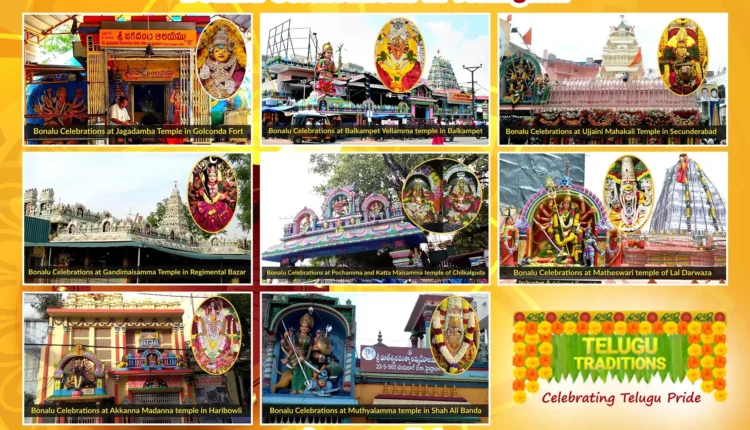Bonalu : India Known for its vibrant and diverse cultural tapestry, is home to numerous festivals that showcase the country’s rich traditions and spiritual beliefs. One such remarkable celebration is the Bonalu festival, primarily celebrated in the Telangana region. Bonalu A Significant Hindu festival, honors the Hindu goddess Mahakali, symbolizing power and protection. This essay delves into the essence of Bonalu, exploring its history, rituals, and cultural significance.
What does this article contain?
Historical Background
The origins of the Bonalu festival can be traced back to the 19th century in the city of Hyderabad, Telangana. It is believed to have originated from the rural communities and agrarian practices that worshipped the Mother Goddess for protection from epidemics, diseases, and calamities. The word “Bonalu” is derived from the Telugu words “Bhojanalu” and “Aatalu,” which means “meals” and “dance” respectively, signifying the offering of meals and traditional dance performances as acts of devotion.
Rituals and Celebrations
Bonalu is a month-long festival celebrated during the months of Ashada and Shravana, typically falling in July and August. The festival commences with the “Ghatam Procession,” where a decorated pot known as the “Ghatam” is carried in a grand procession to the temple.
The ghatam has a distinctive shape with a narrow mouth at the top and a wide body. It is usually made by hand using a special type of clay that is suitable for creating sound. The pot is shaped and then dried in the sun before it is fired in a kiln. The firing process gives the ghatam its unique sound characteristics. This signifies the invitation of the goddess to descend and bless the devotees. The procession is accompanied by vibrant music, drumbeats, and women balancing pots filled with offerings on their heads, a spectacle that exemplifies the enthusiasm and devotion of the participants.
The main highlight of the festival is the “Bonalu Jatara,” a day dedicated to offering prayers to the goddess. Devotees dress in traditional attire and carry pots filled with rice, curd, jaggery, and other auspicious items as offerings. These pots are often decorated with colorful flowers, turmeric, and vermillion, symbolizing purity and devotion. The offerings are presented to the goddess at the temple, where priests perform elaborate rituals and chant sacred hymns, invoking the blessings of the deity.
Cultural Significance
Bonalu holds immense cultural significance for the people of Telangana. It acts as a unifying force that brings communities together, irrespective of caste, creed, or socio-economic background. The festival fosters a sense of unity and camaraderie, promoting social harmony and collective celebration. It also provides a platform for local artisans, musicians, and performers to showcase their talents through traditional dance forms like “Ghoomar” and “Bathukamma.” These cultural performances not only entertain but also serve as a means to preserve and pass on the region’s rich heritage to future generations.
Bonalu & Lifestyle Of Telangana
Furthermore, Bonalu is deeply rooted in the agrarian lifestyle of Telangana, reflecting the importance of nature and agriculture in the lives of its people. The festival acts as an expression of gratitude to the goddess for a bountiful harvest and protection from natural calamities. It serves as a reminder of the symbiotic relationship between humans and nature, emphasizing the need for environmental stewardship and sustainable practices.
The Bonalu festival stands as a testament to the devotion, cultural richness, and unity of the people of Telangana. It exemplifies the indomitable spirit of the community, showcasing their deep-rooted faith and gratitude towards the goddess Mahakali. Beyond its religious connotations, Bonalu encapsulates the essence of social harmony, cultural preservation, and environmental consciousness. As this vibrant celebration continues to thrive and evolve, it remains a significant part of Telangana’s cultural fabric, captivating the hearts and minds of those who participate in this remarkable festival.
Also Read : Bonalu : Big Celebrations At Lal Darwaza Hyderabad

